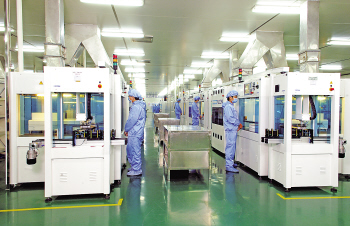 Either upgrade or exit. In this cold winter of photovoltaics, companies can only have the opportunity to survive if they want to change their initiative. China's largest photovoltaic company Yingli has formulated the "334" strategy and improved "the most complete industrial chain photovoltaic company."
Either upgrade or exit. In this cold winter of photovoltaics, companies can only have the opportunity to survive if they want to change their initiative. China's largest photovoltaic company Yingli has formulated the "334" strategy and improved "the most complete industrial chain photovoltaic company." Thousands of Yingli employees were assembled in Yingli Group headquarters square. Miao Liansheng conveyed his new strategy on the stage and reviewed the misjudgments of the situation. "I have overlooked a problem and it is a major mistake. Many countries are faced with elections this year, which has a great impact on the industry."
Miao Liansheng is the chairman of Yingli Group, and Shi Zhengrong, Gao Jifan, and Xiao Xiaoyu are known as the "four kings" of China's photovoltaic industry. Among the four people, Miao is known for its boldness and boldness. On September 17th, the Yingli Group issued a proposal to the staff to overcome the crisis, all of which disclosed the interest of Miao. "Break out and jump out, kill a blood road, climb over the snow-capped mountain of photovoltaics, can we welcome the beautiful spring of photovoltaic industry!"
Like other PV companies in China, the cold winter of domestic and diplomatic photovoltaics did not allow Yingli to be alone. In the group's recently published internal publications, there is a paragraph about this: For the past 14 years since entering the photovoltaic industry, Yingli, like other domestic counterparts, has been focusing on rapid expansion, rapid expansion and competition for market share, but has accumulated a lot of structural and qualitative Contradictions, which led to a series of problems such as the lack of independent innovation, overcapacity, a weak management foundation, and diluted corporate culture, have seriously hampered the sustainable development of enterprises.
"Under the current industry situation, companies do not actively change their minds, and all employees are not actively transitioning and upgrading. There is no way out. Either upgrade or out." Miao Liansheng said. In fact, after more than 10 years of rapid expansion, Yingli has come to a point of deep adjustment and integration.
"334" strategy
Yingli, once recognized by the industry as "the most complete industrial chain photovoltaic company," has found itself missing one of the most important applications - power plants.
For many years, Miao Liansheng, as the headman, had two major taboos on corporate strategy: neither power plants nor thin-film solar power. Ever since Yingli produced photovoltaic products for 14 years, no one has ever dared to go over the mine.
Liang Tian, ​​Director of Public Relations of Yingli Group, explained to the reporter: “The power station was not our core business before, but the film technology is relatively immature and the conversion efficiency is low, so these two aspects have not been involved.â€
This time, in the face of the menacing PV storm, it has always been reluctant and tough to share the temperament of Miao Liansheng, and finally broke his taboo of thinking. In response to the current sluggish industry, Yingli has formulated the "334" strategy.
Miao Liansheng explained that “the so-called 334 strategy, that is, the future distribution of Yingli photovoltaic products will be 30% of ground-based photovoltaic power plants, characterized by large shipments; 30% is a roof system, take the road of lightweight, combined with rooftop power generation The efficiency is high; 40% is a decentralized, stand-alone photovoltaic system, and the risk of quick return is low."
In order to adapt to this strategy, Yingli has begun to consciously control its production. Although Yingli expects to double its output by 2014, Yingli has also lowered its annual PV module shipment target this year, down from the original set of 2.4 to 2.5 GW to 2.1 to 2.2 GW.
In Liang Tian’s view, in the future, Yingli’s production of products will adopt production capacity based on orders rather than production alone. “The previous model of the seller’s market has ceased to exist, so it is now necessary to control costs in production so that production and sales can achieve a reasonable balance.â€
In order to tie in with the "334" strategy, Yingli is exploring the "one-stop" model in its marketing model. This model will be user-centric, that is, allowing users to self-produce products, independent installation, Yingli provides consulting, maintenance and other full-service.
Relatively speaking, the previous model was for customers to buy 10MW or even 100MW products at a time, and then sell them to the downstream installers. The “one-stop†model was implemented by residents taking products and self-service installation.
At present, Yingli has built its first demonstration center in Spain. They have placed various components, cables, inverters, etc., and local residents can go home and install them simply by taking them. In fact, this is a very slow cultivation process. After Spain's pilot, it will be laid out globally. Yingli has already figured out many sales models. For example, they cooperated with local banks and made a complete set of financing system model and power generation rate model. These patterns are well copied. Since September, Yingli has already extended this "one-stop" model to Germany, Italy, and Greece. After that, it will be extended to Singapore and Singapore will radiate throughout Southeast Asia.
As expected, this "one-stop" model will account for 40% of Yingli's total shipments in the future. In the second half of next year, Yingli will have a dozen series of products that will enter supermarkets in Europe, America and Japan.
Rice Miller Parts,Rice Huller Machine,Automatic Rice Mill Plant,Mini Rice Mill Plant
Hunan Nongyou Machinery Group CO.,LTD , https://www.ricemill.nl